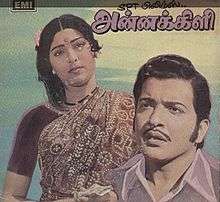Annakili
| Annakili | |
|---|---|
 Release poster | |
| Directed by | Devaraj Mohan |
| Produced by | P. Thamizharasi |
| Written by | Panju Arunachalam |
| Story by | R. Selvaraj |
| Starring |
Sivakumar Sujatha |
| Music by | Ilaiyaraaja |
| Cinematography | A. Somasundaram |
| Edited by | B. Kandasamy |
Production company |
S. P. T. Films |
Release dates | 14 May 1976[1] |
Running time | 134 minutes |
| Country | India |
| Language | Tamil |
| Box office | Rs.4 Lakhs |
Annakili is a 1976 Indian Tamil-language drama film directed by Devaraj Mohan, starring Sivakumar, Sujatha and Phataphat Jayalaxmi in lead roles.
The film was produced by SP Thamizharasi under the production banner "SPT Films". The film stars Sivakumar, Sujatha in lead roles with Sreekanth, Thengai Srinivasan and SV Subbiah playing supporting roles. The film's story was written by R. Selvaraj and the screenplay, dialogues and lyrics were written by Panchu Arunachalam. A. Somasundaram and Kandasamy handled cinematography and editing respectively.
The film revolves around Annakili who falls in love with teacher Thyagarajan. Due to circumstances, Thyagarajan marries another girl. Azhagappan, a womaniser creates misunderstanding about Annakili among villagers, rest of the film shows how Annakili proves her innocence. The film was released on 14 May 1976 with a reel length of 3,654 metres (11,988 ft) and became a commercial success at box office. The film was screened at Indian Panorama Film Festival in 1978.
The film's soundtrack was composed by Ilaiyaraaja who made his debut as composer with this film.
Cast
- Sivakumar as Thyagarajan
- Sujatha as Annakili
- Phataphat Jayalaxmi
- Venniradai Moorthy
- S. V. Subbaiah
- Sreekanth
- Thengai Srinivasan as Azhagappan
- Goundamani
Production
During the discussion at Mahabalipuram, Selvaraj narrated the story of Maruthavachi to Panchu Arunachalam who liked the plot and decided to produce the film.[2] Selvaraj and Arunachalam wanted S. P. Muthuraman to direct the film as he was busy with other commitments, Selvaraj chosen duo Devaraj Mohan to direct the film.[2] The film was entirely shot at Thengumarada near Sathyamangalam and was produced under the budget of 400000 with Devaraj Mohan being paid 7500 together and Ilayaraja and Selvaraj both receiving 2500 as remuneration.[2] According to producer G. Dhananjayan in his book Pride of Tamil Cinema, the scene of Annam offering her lover to Sumathi was inspired from 1962 film Senthamarai and the climax scene of the theatre getting burnt was similar to the climax of Kannagi (1942).[2] [3]
Soundtrack
| Annakili | |
|---|---|
 | |
| Film score by Illayaraja | |
| Genre | Feature film soundtrack |
| Length | 23:54 |
| Label |
EMI The Gramaphone Company of India Limited |
The film's soundtrack was composed by Ilaiyaraaja who made his debut as composer with this film and lyrics were written by Panchu Arunachalam. Selvaraj insisted to have Pavalar Brothers to compose the music but Panchu selected to David Rasaiyya to compose as he felt it was not appropriate to have three brothers to compose music.[2] Panchu Arunachalam added "Ilaiya" (Ilaiya means younger in Tamil language) as prefix in his name Raaja and he named as "Ilaiyaraaja" because in the 1970s there was one more music director A. M. Rajah who was a popular one. For the soundtrack, Ilaiyaraaja applied the techniques of modern popular film music orchestration to Tamil folk poetry and folk song melodies, which created a fusion of Western and Tamil idioms.[4][5] The song "Machanai Paartheengala" was originally composed and sung at a marriage by Ilaiyaraaja and his orchestra even before the film's release.[2] Raja wanted Lata Mangeshkar to sing the title song however due to her non-availability he chose Janaki to sing the song. Although before choosing Janaki, the famous folk artist at that time L. R.Eswari was preferred. Eswari apparently rejected as the music direction is by a newcomer. Ilaiyaraaja after that never used L.R.Eswari for ever.[2] The violin portions of the song were used by music director K for the song "Bar Anthem" in Mugamoodi (2012).[6] The song "Sonthamillai Banthamillai" is based on Nadanamakriya raga.[7] All the songs were well received with Dhananjayan noting that the songs "helped tremendously in film's success".[2]
- Annakili Unnai - S.Janaki
- Machaana Pathingala - S.Janaki
- Muththu Muththa (Adi Raakayee) - S. Janaki
- Annakili (M) -TM Soundarajan
- Sontham Illai - P Susheela
References
- ↑ Rangan, Baradwaj (21 May 2016). "A king and his times". Baradwajrangan.wordpress.com. Retrieved 8 August 2016.
- 1 2 3 4 5 6 7 8 Dhananjayan 2014, p. 237.
- ↑ "Return of the counter". The Hindu. 21 May 2016. Retrieved 26 May 2016.
- ↑ Greene PD 2001, p. 171, 172.
- ↑ Sivanarayanan A. 2004, p. 56-58.
- ↑ "Mugamoodi". The Hindu. 29 July 2012. Retrieved 12 September 2015.
- ↑ Kolappan, B. "In tune with nativity and modernity". The Hindu. Retrieved 12 September 2015.
External links
- Annakili at the Internet Movie Database
Bibliography
- Baskaran, Sundararaj Theodore (1996). The eye of the serpent: an introduction to Tamil cinema. East West Books (Madras). Retrieved 5 January 2012.
- Titon, Jeff Todd; Fujie, Linda; Locke, David (January 2009). Worlds of Music: An Introduction to the Music of the World's Peoples, Shorter Version. Cengage Learning. p. 210. ISBN 978-0-495-57010-3. Retrieved 5 January 2012.
- Dhananjayan, G. (2014). Pride of Tamil Cinema: 1931 to 2013. Blue Ocean Publishers.